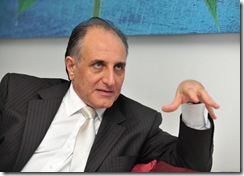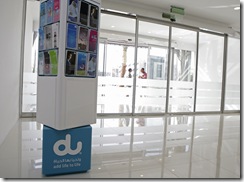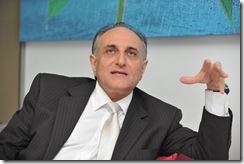The UAE’s second telco Du has been an unbridled success in its years of operation, given the impact it has had on the country’s ICT landscape. Given its significant government ownership and the limited scope for free market competition, Du has still gone on to make the best of its situation, with a focus on SMEs, data, and new revenue growth opportunities
Sultan has been CEO of Du since its launch and has been instrumental in having the telco develop its own competitive edge despite the highly regulated nature of competition permitted in the country
When Du began offering mobile services in February 2007 it faced a well entrenched incumbent in Etisalat, used to having things very much its own way. What the second telco has been able to achieve in little over five years has been remarkable, and while much of the early success was garnered in the mobile and consumer space, Du is looking to develop other areas of success.
In 2008, less than two years after launching its mobile network, Du reported its first full year net profit to December 2008. Net profit for the year before royalty came to AED8 million (US$2.18 million), up 100.9 per cent from a loss of AED885 million a year earlier.
The figures have continued to improve since that first net profit was announced. In its latest quarterly results to end-March 2011, Du reported revenue of AED2.038 billion, an increase of 29 per cent year-on-year. The company’s earnings before interest, tax, depreciation and amortisation (EBITDA) jumped 69.4 per cent year-on- year to AED621 million, while net profit before royalty for the first quarter of 2011 increased 112 per cent to AED412 million.
Subscriber growth and rising data usage were the key drivers behind Du’s strong sustained mobile revenues, which reached AED1.576 billion, up 35 per cent year-on-year. Mobile data revenues more than doubled from AED59 million in Q110 to AED141 million a year later and accounted for nine per cent of total mobile revenues.
Du said it added 272,000 net active mobile subscribers during the quarter, taking its wireless customer base to 4.61 million as at end-March, of which 306,400 were postpaid customers (seven per cent of the total base), up 87 per cent year-on-year.
Mobile average revenue per user (ARPU) remained steady, at AED118 for the quarter, up from AED108 during the same period a year earlier. Revenues generated by Du’s fixed business, including fixed telephony, TV and broadband, amounted to AED337 million, a 27 per cent year-on-year increase. The company’s fixed line subscriber base grew 27.3 per cent from 456,700 in the first quarter of 2010 to 581,500 a year later, with 20,700 lines added during the quarter. Du has forecast a nationwide rollout of its fixed line services before the end of the year.
“For sure, we have succeeded in bringing in a highly differentiated value-driven product offering,” Osman Sultan, CEO of Du tells Comm. in reference to the telco’s development of its post-paid base. “Our recently launched Elite Super Plan(s) take this further and offer highly focussed deals, the likes of which have never been seen in the market.”
Earlier this year the UAE’s Telecommunications (TRA) confirmed that the country’s two mobile networks would launch mobile number portability (MNP) this year. In preparation Du has already established a swift process to enable mobile users to change their network without changing their number. Furthermore, Sultan says the telco has outlined its proposition to demonstrate why customers should subscribe to or remain on the Du network.
“We firmly believe that MNP will offer greater choice and value to mobile subscribers in the UAE, and we look forward to 2011, which will bring us a significant opportunity to cater more effectively to mobile customers across the country, enabling us to improve, grow and deliver our products and services to meet the needs of our subscribers,” Sultan says. 
Beyond looking to benefit from the expected gains from the introduction of MNP, Du has identified small and medium size enterprises (SMEs) as a strong segment for growth, which has until now been underserved. Sultan claims that in the past telecom offerings typically catered to two ends of the spectrum – business or consumer – which often did not meet the requirements of SMEs. He says Du has recognised that the SME sector is one of the biggest economy drivers for most countries and the UAE is no different. Thus the telco has proactively segmented the market to provide customised packages directed at not only meeting the requirements of the SME segment, but also providing the additional benefit of value and variety.
“We are nurturing this segment and have taken pioneering steps in reducing the corporate entry barrier making our offerings more accessible to the UAE’s SMEs,” Sultan says. “Our focus is now on the SMEs – a segment which we believe holds a lot of potential. Our long-term goal is to become a preferred partner to our customers with our end-to-end offerings, and not just be viewed as a bandwidth provider.”
Du’s efforts to bolster its position in the wider enterprise space are self-evident. In June 2011 Du announced the signing of a services agreement with US communications company Verizon, allowing the UAE telco to offer a comprehensive suite of managed services. The services to be offered to Dubai-based global enterprise customers include Private Internet Protocol (PIP), Ethernet Private Line Service (EPL), and Ethernet Virtual Private Line service (EVPL).
The agreement also gave Du access to Verizon’s global PIP network enabling the UAE telco to offer large business customers in the region a complete suite of enterprise IP, Ethernet and data services.
And in March Bahrain telco Batelco announced the launch of MPLS IP VPN interconnectivity, in partnership with the UAE’s Du, allowing the two telcos to further enable both parties to extend corporate VPN solutions between their respective markets. The agreement provided end-to-end MPLS VPN services to Bahrain and UAE-based businesses that wish to establish secure inter-office connectivity between both locations.
Having consolidated its position in the mobile telecom space with a market share of around 40 per cent, Du has spent the past year developing its fixed-line credentials also. Sultan says a significant milestone in the development of the telco’s network in 2010 was the migration to an IP network that has enabled the convergence of Du’s fixed and mobile networks.
“We now have a common IP core for both fixed and mobile networks, which means we have one vehicle that runs our entire network operations, a feat very few operators globally have achieved. What this means is that we have increased our operational efficiency dramatically.”
This year Du is also set to roll out its fixed-line services beyond the economic free zone areas of Dubai, in which it has so far enjoyed a virtual monopoly. Du has been instructed to network share with Etisalat in the undertaking of the nationwide roll-out of its fixed-line network.
According to Sultan, Du is in the final stages of testing its fixed-line deployment, with plans to start testing services live on a soft launch basis, imminently.
in the final stages of testing its fixed-line deployment, with plans to start testing services live on a soft launch basis, imminently.
Du is looking to expand its national presence, widen its product portfolio, and increase the number of retail outlets
“With this initiative taking wings, both operators will be able to offer services outside their current fixed-line networks by the end of second quarter. We will announce our roll out for our fixed-line network in a phased manner once the infrastructure sharing is completed in June,” Sultan says.
The telco’s fixed-line network is not the only area Du is planning to make a national impact on. As Du moves forward to offer its services nationally – Sultan says senior management realised the need to also expand Du’s retail footprint with a primary focus to enhance the telco’s customer service.
“With a national roll-out on the horizon, we will be in a position to reach out to a larger addressable audience, and consciously believe that a sound retail strategy will be a determining factor in shaping the UAE’s telecommunication landscape,” Sultan says.
Aside from the widening of its retail and geographic scope, Du is also on a determined path to widen its product portfolio given the telco is entering a more mature phase in the company’s life. Thus Du is looking to expand its horizons from pure growth to driving value by seeking to launch new diversified initiatives through the establishment of EITC Investments Holding Limited. Sultan says this new entity has the strategic vision of identifying and nurturing new revenue growth opportunities that complement Du’s core business.
“We have identified several exciting new growth areas, and details will be shared as and when they are finalised. Among them includes Anayou, which launched in October 2010 and acts as a central portal for all types of entertainment content,” Sultan says. “It provides users with all types of entertainment news; reviews of movies and music; movie details, trailers and cinema listings; songs, music videos and lyrics; celebrity news, photos and profiles; forums and more. In short, it is a promising new online social networking forum designed to meet the requirements and demands of youth in the Middle East.”





0 comments ↓
There are no comments yet...Kick things off by filling out the form below.
Leave a Comment